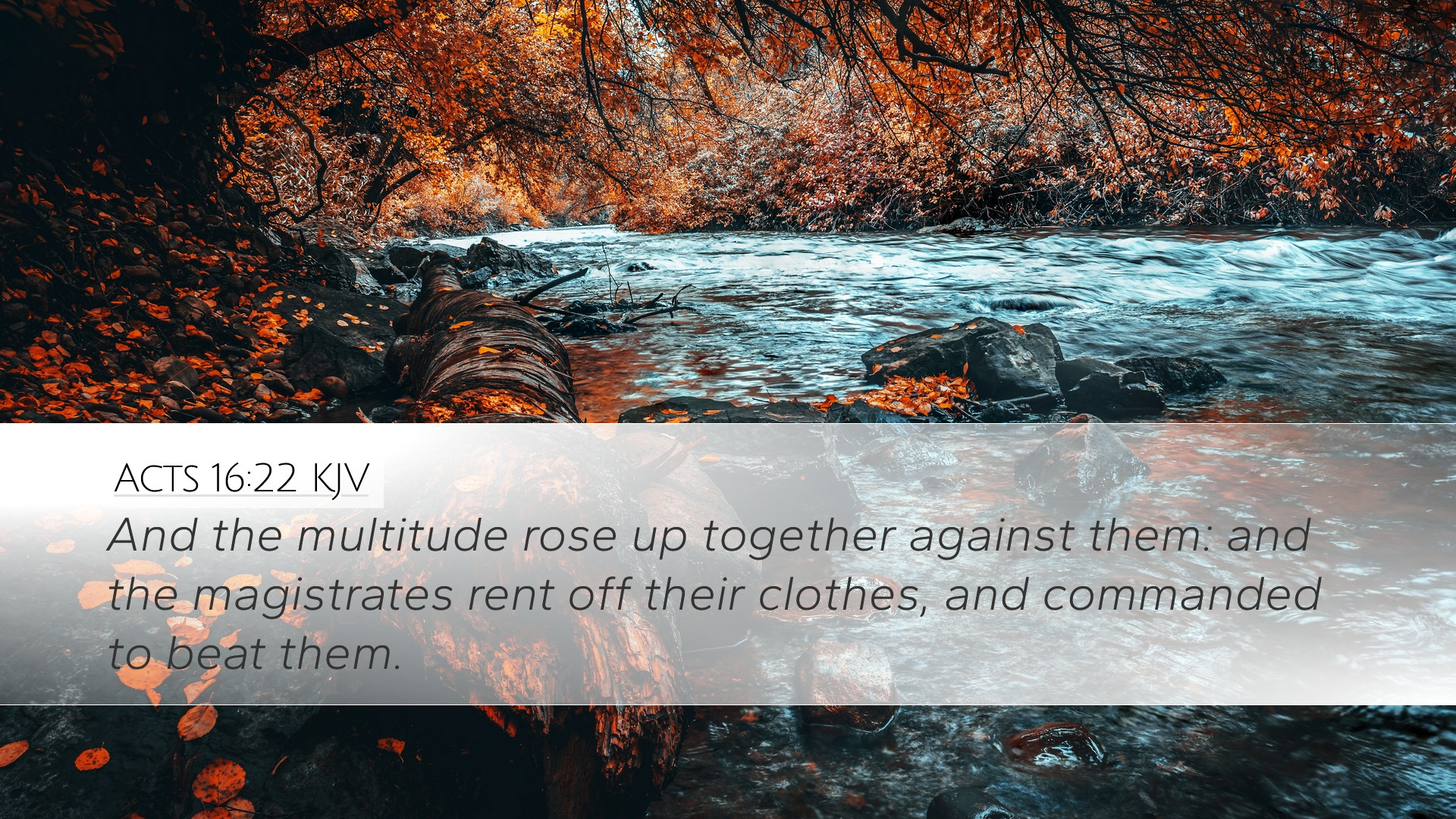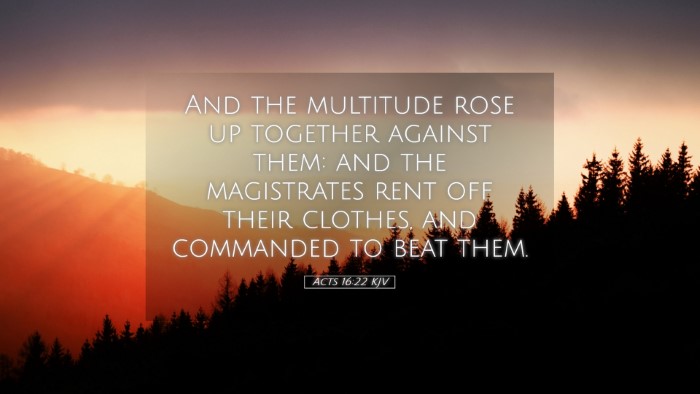Commentary on Acts 16:22
Verse: "And the multitude rose up together against them: and the magistrates rent off their clothes, and commanded to beat them."
Introduction
The passage from Acts 16:22 serves as a significant moment in the apostolic journey of Paul and Silas. This verse encapsulates the intense opposition they faced while spreading the gospel in Philippi. Understanding the socio-political context, the motivations behind this opposition, and the implications for the early church is vital for pastors, students, theologians, and Bible scholars.
Contextual Analysis
- Historical Background: The city of Philippi was a Roman colony, which provided its citizens with certain privileges, including citizenship and rights under Roman law. The local magistrates wielded considerable power and were protective of public order.
- Social Dynamics: The newly formed Christian community threatened the existing social structure, particularly with the conversion of Lydia and the exorcism of a fortune-telling slave girl, which led to economic distress for her owners.
- Spiritual Warfare: The encounter with the slave girl, which leads to Paul’s insistence on exorcising her, highlights a spiritual confrontation with the prevailing pagan beliefs of the time.
Commentary Insights
Matthew Henry's Perspective
Matthew Henry emphasizes the emotional and spiritual aspects of the events. He notes that the rising of the multitude against Paul and Silas was driven by a mix of jealousy and the desire to maintain societal norms. The ripping of clothes signifies public humiliation, a common practice in cases of extreme injustice, indicating the seriousness with which the magistrates took the situation.
Albert Barnes' Observations
Albert Barnes points out the injustice of the magistrates’ actions, who acted quickly and without due process. He describes the public outcry as a reflection of the mob mentality, where reason and justice are often cast aside for the sake of popular opinion. Barnes also highlights that such actions against Paul and Silas were more than just personal; they were against the transformative message of the Gospel.
Adam Clarke's Commentary
Adam Clarke brings attention to the legal implications. He discusses the rights of Roman citizens, which Paul and Silas were, and how the magistrates' actions were not only unlawful but also a violation of their rights. Clarke suggests that this moment serves as a reminder of the cost of discipleship and the inevitable opposition Christians may face when confronting prevailing winds of society.
Theological Implications
- Suffering for Righteousness: Acts 16:22 illustrates the idea that suffering can accompany faithfulness. This theme resonates throughout Scripture, affirming that believers may face trials for choosing to follow Christ.
- God’s Sovereignty: The events leading to this moment showcase God’s sovereignty even in adversity. Paul and Silas’s imprisonment ultimately leads to the conversion of the Philippian jailer, reminding us that God uses even difficult circumstances for His glory.
Application for Today’s Believers
For contemporary Christians, Acts 16:22 serves as a powerful narrative emphasizing the importance of standing firm in faith amidst opposition. The reactions of Paul and Silas—a response of worship and prayer even in chains—become a model for believers today who are called to respond to adversity with grace and steadfastness.
Endurance in Trials
The example of Paul and Silas encourages Christians to maintain a spirit of joy and hope even when facing persecution. Their story reminds us that while physical and social challenges may arise due to faith, they can lead to divine opportunities for witness and testimony.
Community Reaction
The dynamics between the Christians and the wider community demonstrate how the Gospel can disrupt social norms and expectations. Believers are called to engage with their communities, often challenging unjust practices in love and humility.
Conclusion
In summary, Acts 16:22 encapsulates the essence of early Christian struggles, revealing the complex interplay between faith, social justice, and divine purpose. As we reflect on this verse, may it inspire us to endure in our faith and to approach opposition with the confidence that God is at work, often in ways we do not immediately perceive.
Further Study
- Acts 16:23-34: Following the events of verse 22, explore how God’s intervention transforms the situation.
- Philippians:** Study the letter Paul later wrote to the church in Philippi, reflecting on themes of suffering and joy.
- Early Christian Persecution: Research the broader context of persecution faced by early Christians as depicted in the New Testament.


